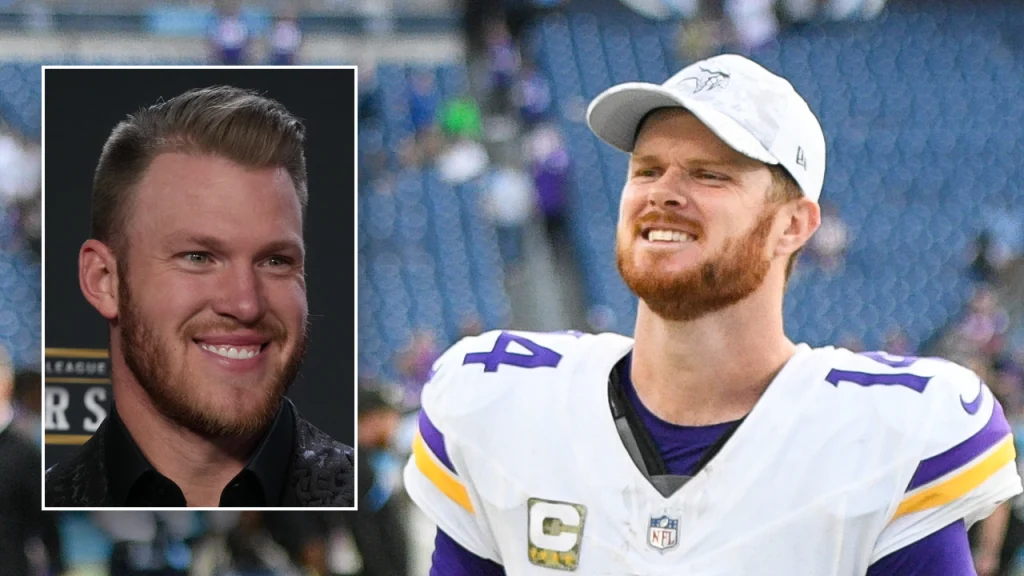Sam Darnold’s resurgence with the Minnesota Vikings has presented the franchise with a complex dilemma. Initially brought in as a backup to rookie J.J. McCarthy, Darnold was thrust into the starting role after McCarthy’s preseason injury. Exceeding all expectations, Darnold has led the Vikings to an impressive 11-2 record through 13 games, showcasing the talent that prompted the New York Jets to select him third overall in the 2018 NFL Draft. His performance has not only revitalized his career but also significantly boosted the Vikings’ playoff prospects. However, his success creates a difficult contractual situation for the team moving forward.
Darnold’s stellar performance, marked by impressive passing statistics including ranking sixth in passing yards, tied for third in passing touchdowns, seventh in completion percentage, and third in quarterback rating, has positioned him for a substantial pay raise. His current one-year, $10 million contract is a stark contrast to the lucrative deals he’s likely to command in the upcoming offseason. Vikings legend Kyle Rudolph acknowledges Darnold’s remarkable turnaround, stating that he’s earned a legitimate, high-value quarterback contract. This poses a significant challenge for the Vikings, who are already committed to substantial financial investments in other key players, most notably wide receiver Justin Jefferson.
The Vikings face a difficult financial balancing act. While Darnold’s on-field performance justifies a significant contract, committing to a large deal for a quarterback would strain the team’s salary cap, especially considering Jefferson’s recent record-breaking contract extension worth $35 million per year. Rudolph draws a parallel to Baker Mayfield’s situation with the Tampa Bay Buccaneers, where Mayfield secured a lucrative three-year deal after leading the team to the playoffs. However, unlike Tampa Bay, the Vikings had already invested a first-round draft pick in McCarthy, creating an added layer of complexity.
The financial constraints imposed by the salary cap force the Vikings to make difficult decisions. Paying both a top-tier receiver and a high-earning quarterback simultaneously presents a significant challenge. Rudolph emphasizes that while Jefferson undoubtedly deserves his lucrative contract, allocating a similar amount to a quarterback would severely restrict the team’s ability to address other roster needs. This creates a difficult predicament for the Vikings, as retaining Darnold at his market value would likely necessitate sacrificing resources elsewhere on the roster.
Despite the looming contractual conundrum, Darnold’s performance has undoubtedly revitalized his career. After bouncing between the Jets, Carolina Panthers, and San Francisco 49ers, he has finally found a system that maximizes his abilities. He has developed strong chemistry with key offensive players like Justin Jefferson, Jordan Addison, T.J. Hockenson, and Aaron Jones, demonstrating comfort, poise, and leadership on the field. Whether he remains in Minnesota will ultimately depend on the team’s willingness to offer a contract commensurate with his newfound value.
While the future of Darnold’s tenure in Minnesota remains uncertain, his contributions both on and off the field are noteworthy. Rudolph participated in a heartwarming event during the Vikings’ Week 13 Salute to Service Game, partnering with Polaris and Call of Duty to surprise two Minnesota veterans with Polaris RZR Pro R vehicles. The veterans also had the opportunity to play the new Call of Duty game with Vikings players. This initiative, coupled with Rudolph’s fundraising platform Altroo, supports the Call of Duty Endowment, a program dedicated to assisting veterans in finding high-quality careers and promoting their well-being. The event underscores the positive impact that athletes and organizations can have in supporting veterans and their communities.


